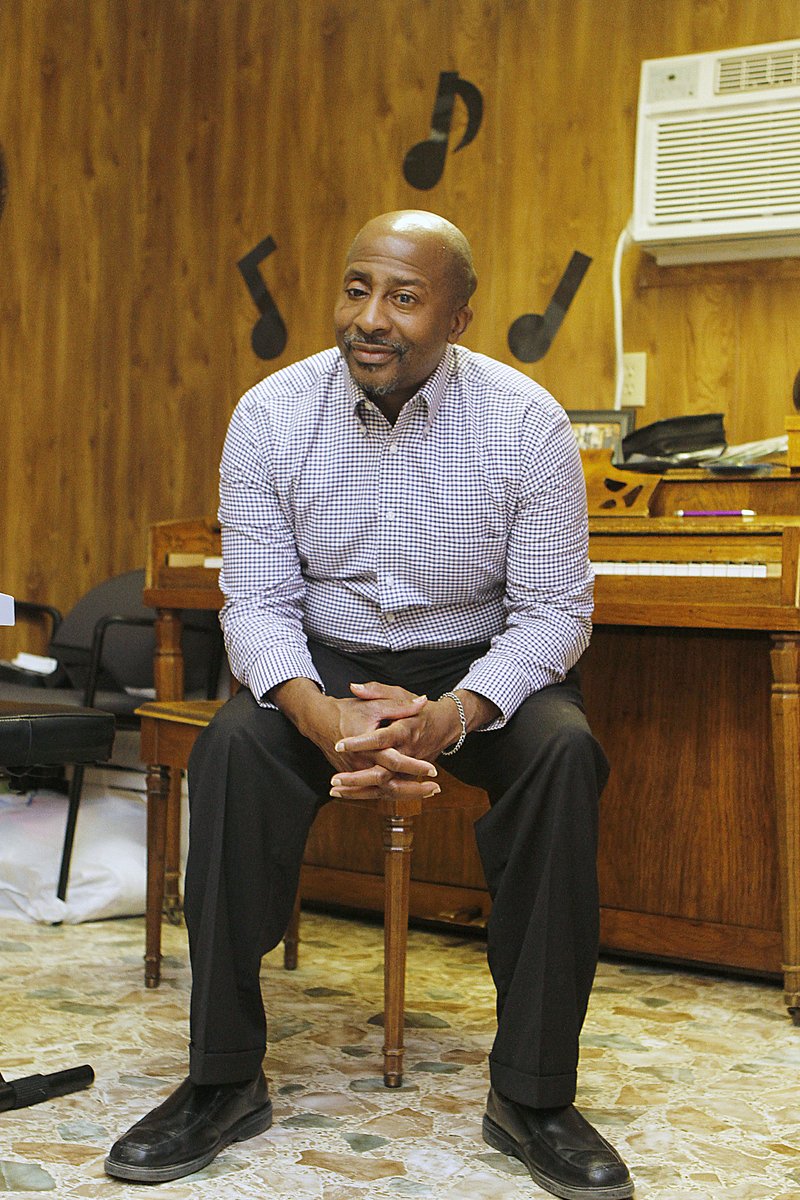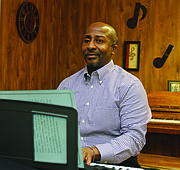Larry “Pee Wee” Woods is visually impaired, but that doesn’t mean that he cannot see.
“I can see life. I just don’t see it as everyone else sees it,” he explained.
Beset by a number of medical conditions that began to rob him of his sight when he was a child growing up in the Fordville Addition, Woods has adapted, adjusted and learned to comprehend the world through a different lens.
He utilizes heightened perceptions of his other senses to navigate his surroundings.
By quieting his mind and listening, Woods said he can hear and “see” the many wonders that life has to offer, often down to the tiniest of details and everyday minutiae that others may sometimes bypass.
“If I hear birds singing, I know the sky is blue, the flowers are blooming and the grass is green. I can tap into that imagery in my mind because I haven’t been blind all of my life,” Woods said.
“If you tell me a color, like red, I’ve seen red before, so I know how it’s supposed to look,” he continued.
Woods approaches other facets of his life in the same way he has adapted to progressive vision loss and its challenges: with faith, determination, resilience and a zest for life.
Obstacles
In his words, Woods has seen enough doctors, taken enough medication and undergone enough medical treatments to last a lifetime.
The 1981 El Dorado High School graduate acknowledges that his health issues have placed many obstacles in front of him and triggered a number of medical crises that have brought him to the brink of death.
At the age of 9, he became the youngest person in Arkansas, at the time, to be diagnosed with glaucoma.
That diagnosis was coupled with another of sarcoidosis, an inflammatory disease that can attack several bodily organs.
The disease mostly targets the lungs and lymph nodes, and those are the areas where Woods’s problems were first diagnosed.
The disease had left scarring on his lungs.
A standout baseball player as a small child, Woods began to notice that playing the game he loved grew harder and harder.
“It got to where I could not walk. I could not hold pencils. Walking from the house to the mailbox, I would get winded. My eyes were swollen and bloodshot red,” he recalled.
A trip to former El Dorado pediatrician Dr. Joseph McKinney, led to the discovery of multiple lymph nodes behind Woods’s ears and in his arms.
A referral to specialists at Arkansas Children’s Hospital — which, at the time had facilities at the University of Arkansas at Little Rock — began a series of trips between doctors’ offices in El Dorado and the state’s capital city for treatments that would last into Woods’s adulthood.
Prescribed medications worsened some health conditions as they helped to improve others.
For instance, seven prednisone pills per day damaged his optic nerves and affected eye pressure that was aggravated by glaucoma.
“I was still able to go to school. My teachers at Hugh Goodwin (Elementary School) noticed the redness and swelling in my eyes,” he noted. “I didn’t feel bad. I just couldn’t breathe, walk or bend my fingers, and it just got progressively worse.”
Upon entering junior high school, Woods said he endured relentless bullying and teasing because of the thick, specialized glasses that he had to wear.
Calling the corrective lenses “hideous,” Woods said that while the experience was tough, he considered the ridicule from his classmates another of life’s challenges that had to be overcome.
“Because of my resilience, I did not let it affect me,” he said.
As a teen, Woods desired to get a driver’s license. With his visual limitations, he was granted special permission from a judge to take the driving exam.
“I passed the written test the first time. I took the driving test, literally, with my fingers crossed over the steering. I passed it, but after I got my driver’s license, I never drove a lick. I just wanted to prove to myself that I could pass the test,” he explained.
Passing the driver’s exam was among a number of goals that Woods would ultimately pursue in life, despite his health issues.
He would go on to graduate from El Dorado High School and head off to the University of Arkansas’s flagship campus in Fayetteville in the fall.
However, just two weeks into the fall semester, Woods’s eye conditions took a turn for the worse, and he had to leave school. Over the years, he developed Temporomandibular joint dysfunction, or TMJ, which affects the jaw joints.
“I developed fever so bad, I couldn’t tell if it was night or day. I couldn’t even feed myself,” Woods recalled, adding that a neighbor and friend hand-fed him during that time.
Due to worsening glaucoma and optic-nerve pressure, he would eventually lose his right eye and wear a prosthesis.
In 2009, the sarcoidosis took aim at his body’s electrical and cardiovascular systems, prompting doctors to implant an ICD, implantable cardioverter defibrillator to constantly monitor his heart rate.
One morning thereafter, Woods awoke to find that his vision had declined even more.
“I was wondering why it was so dark and dim that I couldn’t see my hand in front of my face,” he said.
A specialist in Little Rock determined that the cause was the medication that he was taking to normalize his heartbeat: amiodorone.
“It had taken another chunk of my vision. When I first started taking it, I was taking six at a time because it took 30 days for it to get in your system,” Woods said.
He was faced with a difficult decision: stop taking the medication to keep what remained of his eyesight or risk a deteriorating heart condition that would likely cause him to die.
“I chose to live,” Woods said matter-of-factly.
‘Zest for life’
“I have a zest for life. I wake up every morning to live,” he enthusiastically shared. “I’m a very determined person, and I believe in excellence. I believe that even with limitations, be the best that you can be.”
Woods is pursuing an associate’s degree in criminal justice from South Arkansas Community College, and is on track to graduate in the spring.
He credits his instructors with helping him maintain a 3.96 GPA by giving him the leeway to do some work from home and by teaching in such a way that allows him to paint vibrant imagery in his head and see the subject matter come to life.
Woods said he has also received assistance with everyday living from the Arkansas Department of Human Services Division of Services for the Blind.
Because some of the workers there are also visually impaired, they have firsthand experience in teaching Woods to use the many technological tools and aides that help him cook, use a computer and cellphone, and teach piano lessons in the studio behind his house on North Roselawn.
Woods said he also relies heavily on the help of his family, friends, neighbors, doctors and church family at New Olive Branch Baptist Church — where he serves as minister of music.
He often calls on his support system for help with cooking, other chores and rides to run errands.
“I don’t mind asking for help, and I appreciate everyone and their patience,” he said with a laugh.
And because he has received so much help in his life, Woods believes in paying it forward.
With a passion for helping youth succeed, Woods, an officer in the local Elks Lodge No. 560, worked with the lodge to form Jr. Elk Herd No. 473 in 2005. The Jr. Elk Herd is one of only two such groups in the country, Woods said.
“There are others with youth departments, but ours is the only one with young men only in Arkansas. There’s only one other Jr. Elk Herd in the United States,” he said.
The purpose of the Jr. Elks is to mentor young men and boys between the ages of 13 and 21 by instilling discipline, respect, education and a sense of giving back to the community, among other qualities.
The junior group has volunteered and performed for a myriad of events in the community and has held fundraisers to travel to Florida, Georgia and Houston to compete in the Drill-A-Rama, a national youth competition sponsored each year by the Improved Benevolent and Protective Order of Elks of the World.
In 2012, the Jr. Elks swept the overall competition in the Drill-A-Rama.
The event was held in Houston and the Jr. Elks competed with teams from Texas, Tennessee, South Carolina, Pennsylvania, Ohio and Connecticut in categories including drill and precision, percussion/drumline, leadership and inspection.
“I want to help young people. There are a lot of them struggling because they don’t have positive home lives and because of that type of environment, they give up on themselves,” Woods said.
But giving up is not an option if they encounter Woods.
“I’m a motivator, and I can be aggressive. I’m relentless. I don’t take no for an answer because I didn’t quit, and I’m not going to let you quit,” he said. “If I see a young person struggling, I’m going to help, whether you’re in the Jr. Elks or not.”
Upon graduation from SouthArk, Woods said he hopes to get a job working with youth in some capacity.
No limitations
Woods said much of his can-do attitude comes from his parents, Clarence Woods Sr. and the late Ebbie Ree Woods, and his belief in God.
Woods and his brother Mark, spend their days taking care of their father, who at 91, is experiencing health issues himself.
Woods said his parents stressed education to him and his five siblings, making sure they all received college degrees.
“My dad worked two jobs to pay for gas to get me back and forth to Little Rock when I was sick. We didn’t have insurance back then,” Woods said.
October is national Blindness Awareness Month, and Woods said he hopes that he is a positive representation for the visually impaired community.
“A lot of employers are reluctant to hire us, but I want people to know that we can live, we do live, and we can make a great impact on our society. We can be very useful,” he said.
“For a long time as a kid, I used to wonder why I was the one who had to get this disease. Then I realized it was because God knew I could handle it,” Woods continued. “If it wasn’t for Him, I wouldn’t have made it. I may have limitations, but I don’t let that limit me or stop me from doing what I want to do. I would give the same advice to the visually impaired and the non-visually impaired.”
Tia Lyons may be contacted at 870-862-6611 or tlyons@ eldoradonews.com.


